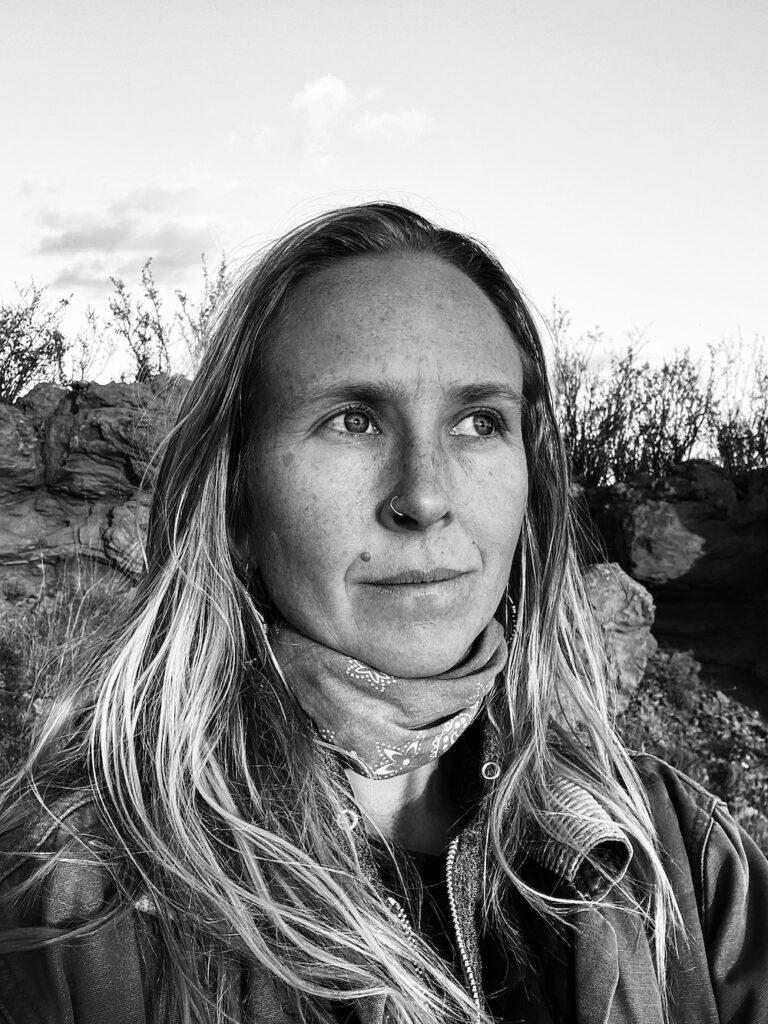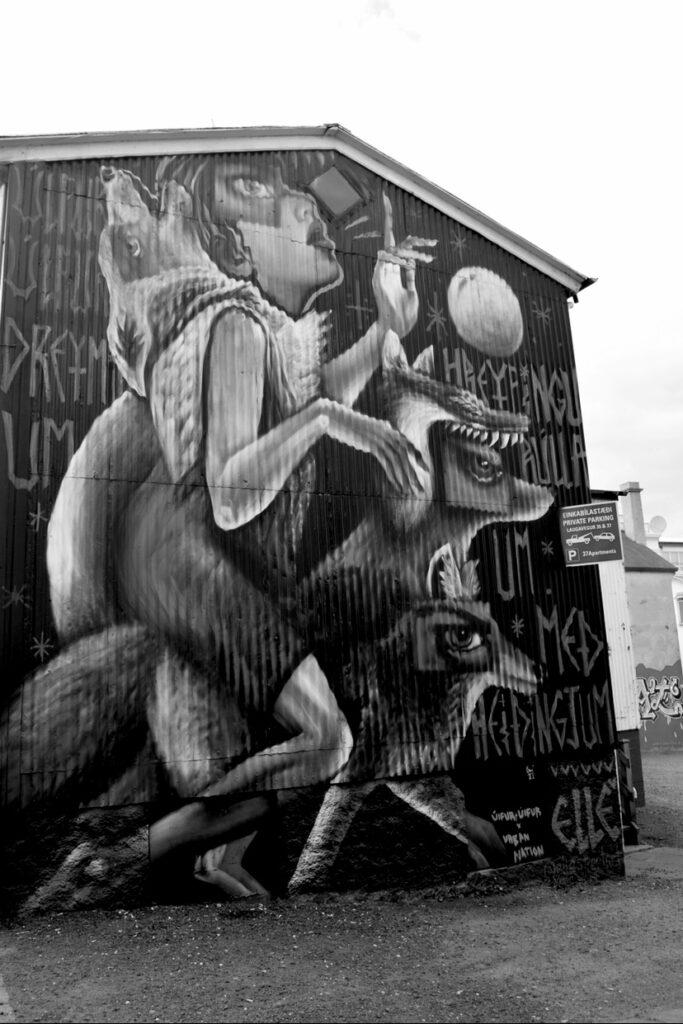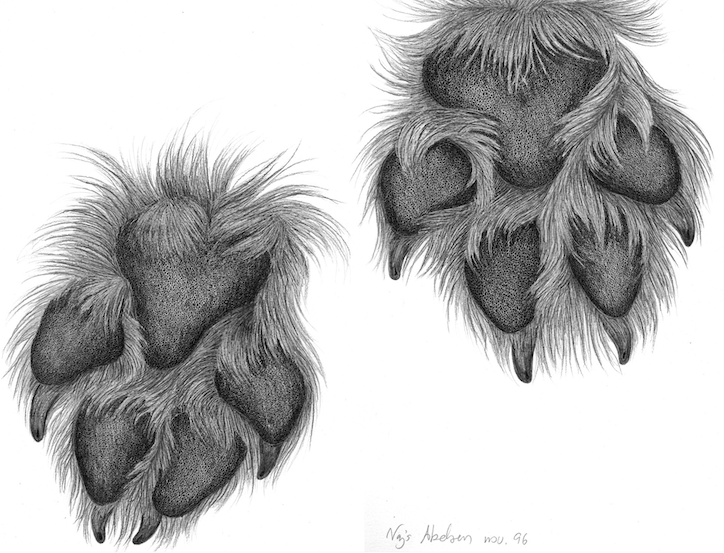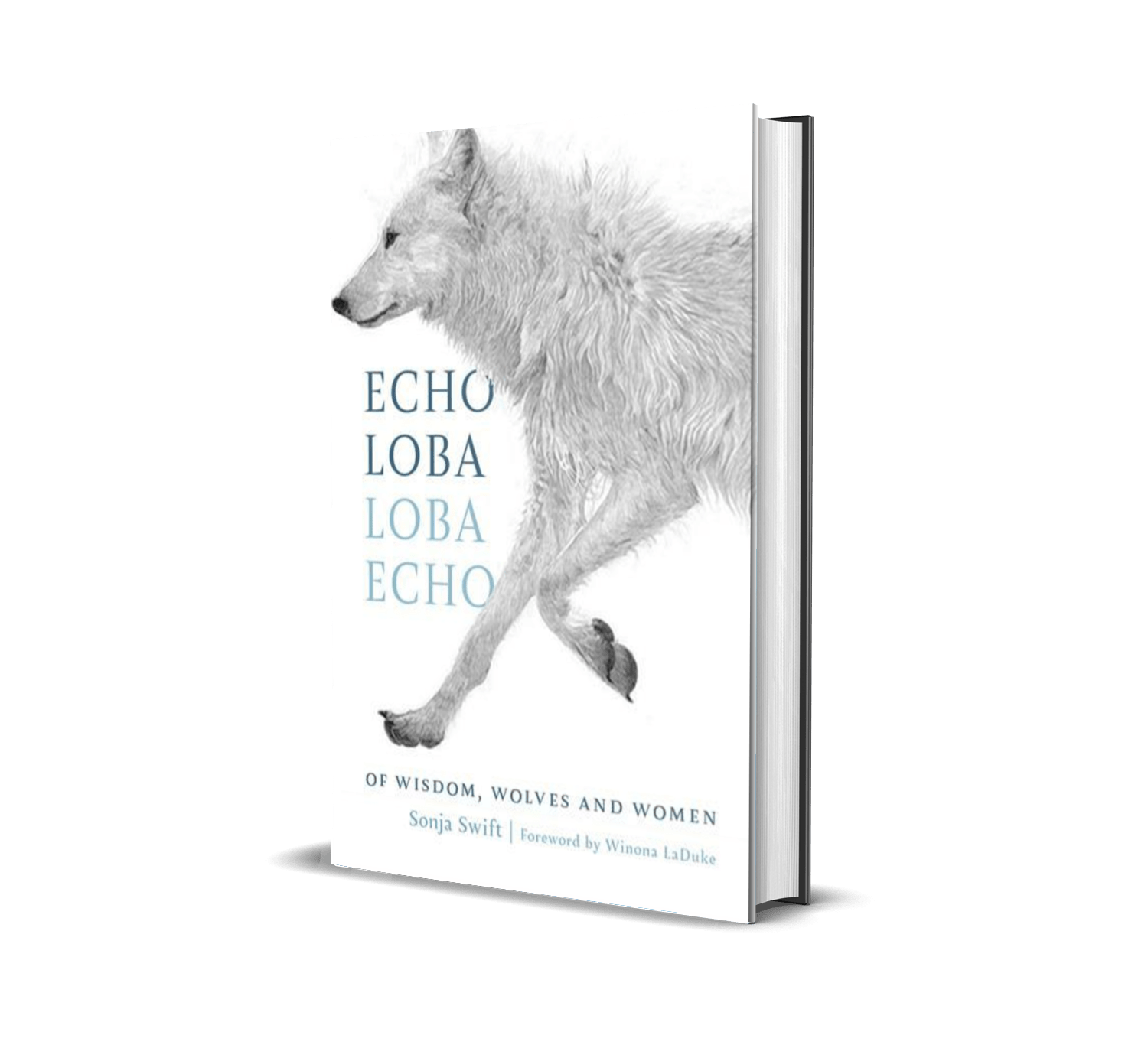Excerpt from Echo Loba, Loba Echo: Of Wisdom, Wolves, and Women by Sonja Swift
Wolf Girl
I was a feral child. I trusted dogs and horses more than most people. The land: reliance. The ocean: solace. Ice-cold North Pacific Ocean. As a 12-year-old sprite, I had to learn how to duck dive my surfboard under, just so, such that the force of swell wouldn’t drag me backwards, suck me into churning whitewash. Back then, I was the only girl in the lineup. It dawned on me years later to ask what of this salt song drive to careen my smallness into heavy waves? Because, oddly enough, it wasn’t just about sport. The ocean became my safe space: roiling, deep blue, salt water. Waves strong as elephants, strong as pillars falling over. Yet water is softer, more malleable, than stone.
That oceanic color blue. Blue: another word for soul, for one’s own unique raw eccentricity, born as we all are from salt water. Blue is a good word for the cellular imprint of gale storms, the experiences of being shaped by them. It is a word for held-in breath, eyes alert, tracking emotion, taut as an arrow at the bow. Blue, another word for void, things unsaid yet sensed as one does a ghost. Blue goes to the sunless depths of the midnight zone. It is a word that is a feeling that is a memory that is a pattern, a tether across lifetimes. It’s also a kind word for where children find places to hide. In the manes of horses. In the ocean tides.


Of being a misfit, there is this story: I am perhaps 9 years old, a newbie to ballet classes, with intrepid trepidation. Auditions for the Nutcracker, the big wintertime show, are to be held. I deliberate but opt to try for it, like I’d later try out for middle school basketball, never having played a game, because even as a girl I trusted my physical capacity, my embodiment. So I put on my tie-dyed purple tutu, and my dad drives me the half-hour to town to climb the polished wooden stairwell and walk toward the dance hall. Upon approach, I begin to notice all the other girls in pink, all pink, and I freeze like a deer. I don’t bolt like one but move rather like a fox, quietly, back outside to the truck, telling my dad we can go home now, tucking my face behind my warm tail.
I play soccer, give up on ballet. Give up on an element of myself, my nature, which is and always has been called to dance. In soccer, I fight. I run with focus, take some of my angst out in this way, though I still learn about my agility and determined strength. Surfing, on the other hand, becomes a sanctuary, oceanic solitude. Ocean and me. This does not mean lonely though, because the land, like the ocean, is good company.
When I think of wolf children, I think of barefoot meanderings, a peculiar kind of solitude, being a misfit, and misunderstanding in relation to other people. I also think of this story about wolf girl.
It is 1835. The month of May. A child is born at the confluence of Dry Creek and Devil’s River in what would become the State of Texas ten years later. Her mother dies in childbirth and her father, as the peculiarities of fate would have it, is killed in a thunderstorm at a nearby ranch where he rode off to in search of help. Mollie Pertul Dent and John Dent, newcomers to this land, dead. The baby girl left alone.
Come 1845, and a boy living at San Felipe Springs, present-day Del Rio, reports seeing “a creature” with long windswept hair attacking a herd of goats alongside several wolves “that looked like a naked girl.” There are further reports of similar descriptions, and Apache People speak of seeing small footprints next to wolf tracks in the red desert sands. So a hunt is organized. A hunt for the wolf child.
Day three of the hunt: wolf girl is cornered in a canyon, and the wolf with her is driven off, then shot after looping back to attack the pursuing men. She is bound, flame-eyed and growling, and carried to the nearest ranch outpost. They tie her up as they would a bucking horse. Leave her in an empty room alone.
That evening the girl won’t stop howling. The men curse her, try to sleep. In the silken shadows, beneath pewter stars, a pack of wolves surround her prison cell. In their slow, deliberate approach they frighten the livestock, and somehow in the midst of hoofed and bleating uproar, she escapes.
The year 1852, and a surveying crew is exploring a new route to El Paso. They report seeing a woman standing on a sandbar overlooking the Rio Grande, high above the confluence with Devil’s River. There are two wolf pups at her side. She is never seen again.[1]
This story, akin to the widely known one about Kamala and Amala, is fact. Witnessed, accounted for. Yet there is also a symbolic element at play here, that of the outcast. Wolf child, wolf girl. A quality of being that is at once natural yet does not fit in. Like wolf, the wolf-girl figure is not to be romanticized. It isn’t an easy or entirely comfortable hide to wear.

To relate to this character is to know an experience of unsettled awkwardness, to question belonging, to veer for the hills. The wolf child/misfit/outcast, in this case, is also only this in relation to the so-called civilized. Silverware from mine shafts. Regiment in the form of breaking, the way horses are “broken.” The camp in the forest where the exiled go could also be called a village.
Once, on a late-night drive uphill to the ridgetop home of my childhood, traversing a familiar winding dirt road, stars visible, smell of sagebrush and oak tannin, I reflected out loud to Marcus how this place was my upbringing. How, as a child, I learned to rely on the land and animal companions. “It’s why I act like a forest child,” I said, only half-kidding. Then, when I jokingly told him he’s helped me adapt to more common human behavior, he said something that made me laugh out loud: “So you’re Mowgli, raised by wolves, and I’m Baloo.”
The recent reproduction of The Jungle Book is a colorful film that won an Academy Award for best visual effects and brought to life the animation classic. Upon leaving the theater, there was a stack of posters depicting the verdant jungle and animal protagonists. I took a copy home. Later, at my kitchen table, staring at the scene of Shere Khan (the tiger), Bagheera (the black panther), Kaa (the python), the clan of monkeys with their giant ape leader King Louie, and the rest of the cast, I noticed the illustrator had left something out. Raksha, who raised Mowgli, Akela, and their pack. There were no wolves.
Feral, in today’s world, basically means at home in open country. That and some version of introverted, reticent, or simply different. My husband, Baloo, proficient in down-home, authentic small talk, an honest man, a says-what-he-thinks man, who speaks with specificity and nuance, not in cliché, has told me plainly how strange I am. By accent, movement, the severity of my expressions, as visible as the way a dog’s tail gives away emotion, or with horses, their ears. He has also valued my particular strangeness such that I have learned to also. This is why we need others who care about us in order to know ourselves. This is also why the lone wolf story is fabricated. Like wolves, we need our people to belong.
That night I slept in my childhood bedroom, remembering the old stained glass image of a howling wolf that once hung in the windowpane of the French doors that opened onto a small balcony. A gray wolf, head tipped skyward, with an indigo, violet, and turquoise colored mosaic night sky for background. Sunlight reflected through the colored glass framed in an oval of brass. As a girl, I stared into it often. It felt like a portal to another world. A world I continue to walk toward.
[1] Retold from a story referenced in Lopez, Of Wolves and Men, 243
Excerpt from Echo Loba, Loba Echo: Of Wisdom, Wolves, and Women by Sonja Swift (Rocky Mountain Books; October 3, 2023). Purchase your copy at Rocky Mountain Books.



